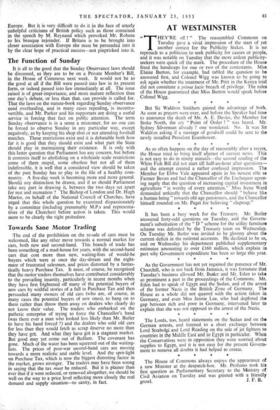Towards Sane Motor Trading
,The end of the prohibition on the re-sale of cars must be welcomed, like any other move towards a normal market for cars, both new and second-hand. This branch of trade has been something of a mad-house for years, with the second-hand cars that cost more than new, waiting-lists of would-be buyers which were at once the day-dream and the night- mare of frustrated salesmen, and prices distorted by a fantas- tically heavy Purchase Tax. It must, of course, be recognised that the motor traders themselves have contributed considerably to the prevailing insanity, particularly in recent months when they have first frightened off, many of the potential buyers of new cars by wishful stories of a fall in Purchase Tax and then persuaded many owners of old cars (who are, of course, in many cases the potential buyers of new ones), to hang on to them rather than throw them away on dealers who clearly do not know their value. The traders who embarked on the pathetic enterprise of trying to force the Chancellor's hand (was there ever a man who looked less likely than Mr. Butler to have his hand forced ?) and the dealers who sold old cars for less than they would fetch as scrap deserve no more than they have got. And what they have got is a stagnant market. But good may yet come out of Bedlam. The covenant has gone. Much of the Water has been squeezed out of the waiting- lists. The prices of post-war second-hand cars are moving towards a more realistic and stable level. And the spot-light on Purchase Tax, which is now the biggest distorting factor in • the market, grows stronger. The traders may have been wrong in saying that the tax must be reduced. But it is plainer than ever that if it were reduced, or removed altogether, we should be well on the way to a price level reflecting more closely the real demand and supply situation—to sanity, in fact.


































 Previous page
Previous page